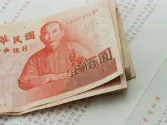
BoC executive warns of risks in wealth management products
There is a proliferation of off-book wealth management products that China's banking sector has to tackle, warns a bank executive.
He warned of a mismatch between short-term products and the longer underlying projects they fund, adding that in some cases the products are not tied to any specific project and that in others new products may be issued to pay off maturing products and avoid a liquidity squeeze.
“To some extent, this is fundamentally a Ponzi scheme,” says Xiao Gang, the chairman of the board of Bank of China, about "Shadow banking," or the short term investment vehicles known as wealth management products.
“Unsurprisingly, although Chinese banks’ non-performing loans are at a low level of 0.9 per cent, the potential risks are worse than the official data suggest,” Xiao wrote, adding that a problem could come as indebted borrowers face cash flow problems or enter default, straining the banking system.
“The music may stop when investors lose confidence and reduce their buying or withdraw from WMPs,” he said, referring to wealth management products.
Wealth management projects, which are technically off-book, have grown to account for about a fifth of all new financing in China. They fund projects, such as property development or infrastructure that have trouble tapping normal loan channels.
Their growth has been spurred by credit curbs meant to rein in speculative property investment and by investors’ desire for higher yields than traditional bank deposits, which often offer negative real interest rates. More than 20,000 of such products are in circulation, up from just a few hundred five years ago.
Although the products are technically more risky than deposits, most investors believe they are backed by the banks’ implicit guarantee and they are marketed aggressively in bank branches nationwide. Xiao acknowledged this perception posed a risk for banks’ bottom line.
“The rollover of a large share of WMPs could weigh heavily on formal banks’ reputations, because many investors firmly believe that banks won’t close down and they can always get their money back,” Xiao said.
For more.














